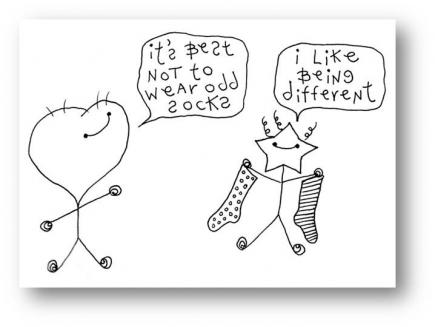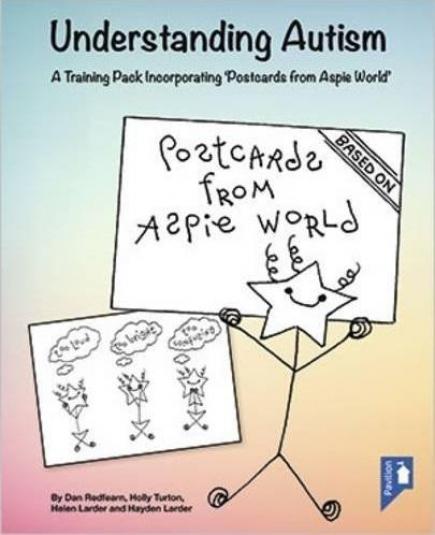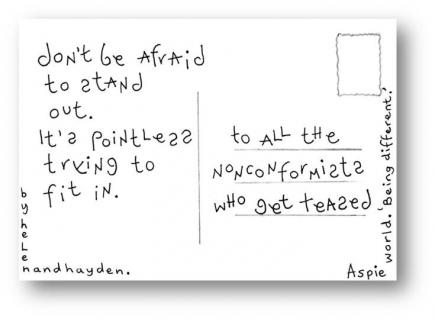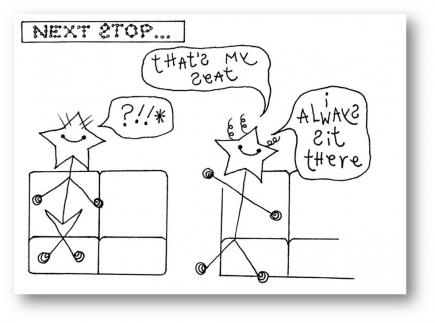An autistic woman and her mother have created 61 postcards showing what it’s like to live with autism to help spread awareness about how to effectively communicate with autistic individuals.
Hayden Larder, 25-years-old, has worked with her mother, Helen, to produce accessible cartoon postcards to help her understand the emotions she was experiencing after being diagnosed with autism.
Helen and Hayden, from Glossop, worked with Dan Redfearn, a nursing and social work lecturer at Salford University, and Holly Turton, a trainee clinical psychologist from Manchester University, to create a training pack to help families and professionals understand the condition.

CHARMING AND FUNNY: Hayden’s first postcards were found by her mother
The National Autism Society explains that autism ‘is a lifelong developmental disability that affects how a person communicates with, and relates to, other people [and] also affects how they make sense of the world around them’, which can have different effects on different people.
Helen explained to MM that ‘a lot of the images show difficulties which many autistic individuals may experience’.
She said: “We decided that we were going to do this not for anyone else, just for ourselves – to make sense of things that we’ve struggled with because of her autism.
“She was diagnosed late [at 16] and it’s been hard for her and me and this is one of the ways we’ve been using to communicate.
“A lot of Hayden’s postcard messages are charming, they’re funny – her view of the world made us laugh. We wanted to make it light-hearted as a calm way to cope with all the anxiety autism can cause.”
The postcards have now been included in a training resource called Understanding Autism: A training pack for support staff and professionals based on Postcards from Aspie World, which will be published by Pavilion on April 4.

COLLABORATION: Hayden and Helen had help from professionals Holly and Dan in creating the training pack
The idea for the postcards came from some cartoon drawings they found that Hayden had done when she was little, which included speech bubbles and messages to her family.
Helen took the drawings and re-drew the characters into scenarios of ‘true life incidents that we’ve struggled with’ while Hayden wrote the speech bubbles, the messages on the back of each card and stories to explain each situation further.
“Her head is a little star and the adult figures are hearts,” she said.
“They’re very sweet [and] Hayden’s humour comes through in a really special way.
“We’ve collaborated all the way along the line with this.”
The postcards attracted a lot of attention from academic professionals when a number of them were displayed at a National Autistic Society conference in London three years ago and many people encouraged Helen and Hayden to get them published.
Helen explained: “I’d like to stress the positives of people on the autistic spectrum.
“They contribute huge amounts to the world’s knowledge, abilities and skills.
“So often people are very negative about having autism or Asperger’s and actually, a lot of people on the spectrum are really happy with their abilities and they know that they contribute a huge amount.
“I’m really proud of my daughter. She is the kindest person I know.”

DON’T BE AFRAID: Dan believes that many problems those with autism face are ‘simply misunderstandings’
Dan, who previously worked with Hayden as a nurse specialising in autism, said: “A lot of the problems that Hayden experienced growing up – as is often the case with people who have autism – were simply misunderstandings.
“For example, if a teacher tells a pupil to look at them, they believe that the child isn’t listening if they aren’t doing so.
“But for autistic pupils, looking at people in this situation can be distracting. Teachers may not understand this and label the pupil ‘difficult’.
“Helping people understand that difference is really important and was at the heart of what I was setting out to achieve when I worked on this training pack.”
The pack contains the box set of 61 postcards, a CD of slides and a training manual with interactive exercises to help people understand autism.
Helen said: “A lot of the top tips that Holly and Dan have included are really great and they are very practical – it’s a really pragmatic, interactive, training course which is, I think, going to be really helpful if people adopt it’.
“It gives people examples of how to cope with different communication and social interaction difficulties, various sensory issues and other things relating to autism.”

ESSENTIAL: Helen believes teachers should receive specific training on dealing with people with autism
A separate set of postcards will be published with a booklet containing Hayden’s ‘life stories’ which will be available to the families of children with autism to help them adjust after diagnosis, as well as a booklet explaining how to use the booklets.
“One in 100 people are on the autistic spectrum and without proper support they can really struggle,” Helen said.
“That’s why we were happy when this was adopted and commissioned by the publishers, because we really want to get the message out there that if you understand people on the spectrum and you are able to communicate in an effective way then you won’t cause problems for them and for yourself.
“I think most people are familiar with the term ‘autism’ but they don’t necessarily know what it involves.
“The people who should be most understanding like teachers, medical professionals, social workers, support workers, don’t always get it and don’t always have the training.”
Helen said that she hopes these postcards benefit other parents of children with autism and says she thinks training teachers on how to help autistic children is essential.
Postcards from Aspie World will be published in April. To learn more, and to find out how to purchase the training pack, click here.



